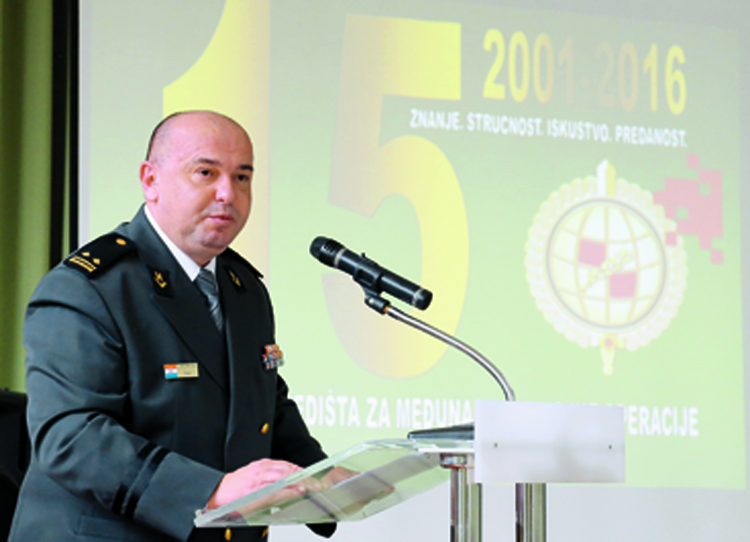The Croatian Armed Forces will be back to the heroic town of Vukovar – an…
International Military Operations Training Centre – A highly recognisable training institution
“In the past 15 years the International Military Operations Training Centre (IMOTC) has become a highly recognisable training institution, eagerly transferring the knowledge and the experience to your numerous trainees. The IMOTC has grown into a respectable centre which has establish a co-operative network with a series of similar institutions in Europe, and its staff is its most valuable asset“, said the Deputy Defence Minister Tomislav Ivić at the ceremony marking the 15th anniversary of the Centre.
The Barracks “Vitez Damir Martić” at Rakitje on 4 March 2016 hosted a ceremony marking the 15th anniversary of the International Military Operations Training Centre. The ceremony was attended by the Deputy Defence Minister Tomislav Ivić, the Chief of the General Staff of the Croatian Armed Forces, Lieutenant General Mirko Šundov, the Assistant Defence Minister Zoran Piličić, the Commander of the Croatian Army, Lieutenant General Mate Ostović, the Head of the Military Intelligence Agency, Brigadier General Ivica Kinder and a number of military and civilian officials.
Addressing the visitors and the members of the International Military Operations Centre, the Deputy Defence Minister Tomislav Ivić said that the participation in international missions and operations and the contribution to the security and stability has earned Croatia international credibility.
Within a short period – from the establishment of the armed forces and their victory in the Homeland War – the Republic of Croatia converted from an international assistance recipient into an active contributor to peace and conflict resolution, and the role has been facilitated by this Centre.
“The IMOTC was the strongpoint of the Croatian defence system with enough relevant experience to prepare the new participants for the deployments in peace support missions and operations joined by the Republic of Croatia“ said Deputy Minister Ivić. He concluded by underlying: “In the past 15 years the International Military Operations Training Centre (IMOTC) has become a highly recognisable training institution, eagerly transferring the knowledge and the experience to your numerous trainees. The IMOTC has grown into a respectable centre which has establish a co-operative network with a series of similar institutions in Europe, and its staff is its most valuable asset.
I am confident that the Centre will continue to invest its energy, motivation and know-how into further development, because they contribute largely to the international recognisability and positive reputation of the members of the Croatian Armed Forces engaged in demanding tasks focussed on global stability and security“.
The Chief of the General Staff of the Croatian Armed Forces, Lieutenant General Mirko Šundov reminded of the inception of the Centre in 2001, which was manned by the participants of the Homeland War and of the peace support missions and operations. “The members of the Centre shared their rich knowledge and experience from the Homeland War, complemented with the valuable experience from the peace operations, with their colleagues preparing for the international deployments. The Centre has since its early days administered a high-level training system, fed back to them through a series of commendations and through the growing number of foreign trainees from allies and partner nations alike,” said Lt. Gen. Šundov.

Summarizing 15 years of the existence of the International Military Operations Training Centre, its Commander, Lieutenant Colonel Plejić quotes the official records: “Over the past 15 years the IMOTC has designed more than 30 various courses and administered some 400 training and other activities. Presently, it administers 12 courses and dozens of pre-deployment training and other activities for the members of the Croatian and the allied and partner armed forces annually. More than 3,500 members of the Croatian Armed Forces and the Ministry of Defence, more than 400 foreign trainees from three continents. As many as 250 staff were engaged throughout the period, and trainees, instructors and lecturers exchanged with nearly 50 different countries”.
The ceremony was an occasion to present the meriting members with the respective awards and commendation certificates. It also featured a presentation video on the IMOTC produced by the Croatian National Television and a musical performance by the Croatian Armed Forces’ Jazz Band.
The International Military Operations Training Centre trained a number of officials from the government administration bodies – in particular Ministry of Foreign and European Affairs, the Ministry of the Interior, the Ministry of Justice and the National Protection and Rescue Directorate – and developed projects with the academic community (the Faculty of Political Sciences and the Faculty of Humanities and Social Sciences of the University of Zagreb).
The courses of the IMOTC are administered observing NATO, the UN and the EU training stadards. The Centre has been certified for three UN courses and is in the process of certification for new NATO and the EU courses as well. Its Commander emphasises proudly: Our courses equal the comparable international training contents, and some of the capablities developed by the Centre are singular at the international level.
Over the past 15 years the IMOTC has designed more than 30 various courses and administered some 400 training and other activities. Presently, it administers 12 courses and dozens of pre-deployment training and other activities for the members of the Croatian and the allied and partner armed forces annually . More than 3,500 members of the Croatian Armed Forces andthe Ministry of Defence, more than 400 foreign attendees from three continents. As many as 250 training staff were engaged throughout the period, and instructors and lecturers exchanged with nearly 50 different countries.
